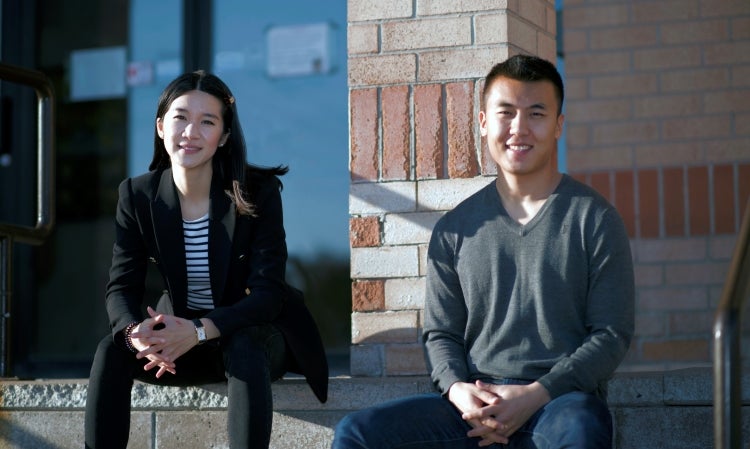Honeybee Trials, a University of Toronto startup that connects research teams with patients and study participants, has been acquired by global clinical trials company Leapcure in a deal that is poised to drive more inclusive and affordable trials that's ultimately applicable to a broader population.
Co-founded by U of T alumni Catherine Chan and Weiwei Li, Honeybee built a web and mobile platform to help clinical trial teams attract, screen, recruit and manage study participants. Since its founding in 2019, the startup has connected over 30,000 patients and participants to more than 1,000 clinical trials across North America.
Leapcure, headquartered in California, offers an array of solutions that combines people-backed services with data-driven technologies to fill clinical trials for global sponsors and CROs, but can now expand affordable patient recruitment to institutional sites, private sites and biotech firms. Moreover, their work alongside patients and advocacy groups has significantly helped to reach underrepresented communities - a focus that will receive a boost following the purchase of Honeybee.
Chan, who earned a master's degree in the Temerty Faculty of Medicine's department of nutritional sciences, says the deal grew out of a desire to partner strategically with a larger company that could provide access to broader sectors within the clinical research world.

"At Honeybee, we offered competitive pricing for academic and hospital sites, local CROs [contract research organizations] and biotech firms," Chan says. "With this partnership, we're able to provide services across all of the different types of trial scopes and sizes."
She adds that both Honeybee and Leapcure have placed a strong focus on diversity, equity, inclusion and accessibility by helping researchers attract study participants of different ethnicities, ages, genders and sexual orientations - helping make clinical trials more equitable and reflective of the wider population.
"It's important to us that there's a mission and vision alignment between the companies... it couldn't be a better fit," Chan said.
The asset purchase deal for an undisclosed amount, which was announced in an Aug. 13 press release, will see Chan transition from CEO of Honeybee to senior director of product at Leapcure.
"We're excited to join forces with Catherine and Honeybee. They've been really focused on the newest recruitment technologies that are most impactful for both patients and research," said Leapcure CEO Zachary Gobst. "A big reason that things came together was our alignment on impact first. It's a credit to how they've been approaching their business the right way from the beginning."
Honeybee evolved out of the frustrations that Chan faced in recruiting study participants for her master's thesis. Motivated to explore solutions, Chan created a prototype that would help match participants with trials; she then enrolled in a one-week accelerator program in the Impact Centre (now the Centre for Entrepreneurship) in the Faculty of Arts & Science.
She soon teamed up with Li, who earned his bachelor's and master's of applied science degrees from the Faculty of Applied Science & Engineering, to co-found Honeybee. The startup later joined the Health Innovation Hub (H2i) accelerator and operated out of office space in U of T Entrepreneurship's ONRamp facility prior to the COVID-19 pandemic.
With COVID-19 measures encouraging the adoption of digital tools by clinical research teams, Honeybee found itself well-placed to play an important role. "The pandemic provided an opportunity for many tech companies to scale as the market became more open-minded and ready to adopt technologies to help connect them day-to-day," Chan says. "We saw a rapid adoption of Honeybee's technology during this time where people moved away from traditional recruitment and patient communications to the current age.
"Although digital adoption across other industries has grown quite rapidly, healthcare has lagged behind, rightfully so and for many reasons, but we're glad the transformation is happening. Just five years ago, clinical trial coordinators were still using paper handouts to recruit on the street and paper calendars to schedule patients.
"The pandemic expedited researchers being able to meet people where they are."
Chan says the acquisition by Leapcure will enable the rollout of tiered services ranging from low-cost, self-serve tiers - targeting research teams with more modest budgets - to higher levels of service that include dedicated management.
"I'm really excited about the solutions we now have to offer together as well as the next steps in how we're going to disrupt clinical trials."
Professor Paul Santerre, co-founder and director of H2i, hailed Chan as "a model outcome" of the accelerator's mission to empower innovators in translating their ideas into products and companies that tackle important problems.
"Catherine and her team's achievements are transformative in terms of democratizing the recruitment of patients for clinical study cohorts," said Santerre, the Baxter Chair for Health Technology and Commercialization at the University Health Network and professor in the Faculty of Dentistry and Institute of Biomedical Engineering who is cross-appointed to the department of chemical engineering and applied chemistry.
"She has much to still teach us about the power of digital tools and their ethical use to achieve impact in clinical research trials - and this acquisition will accelerate that outcome."






